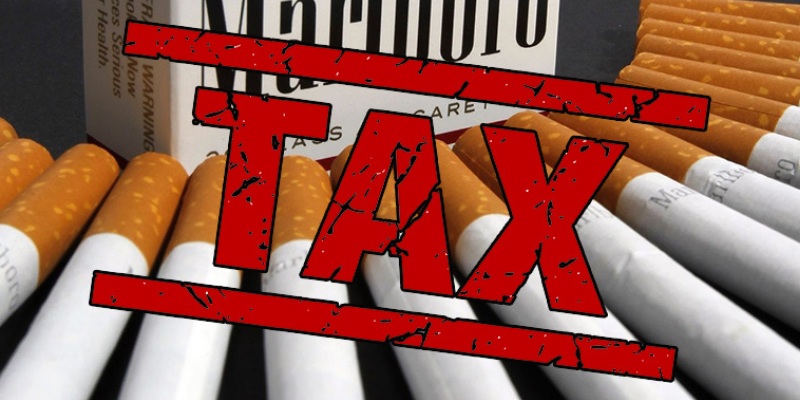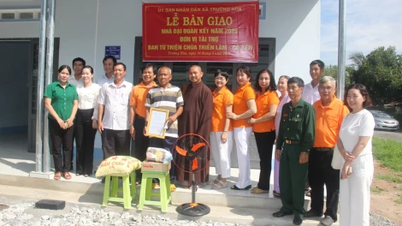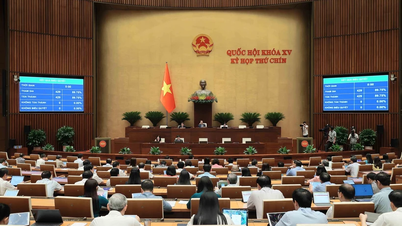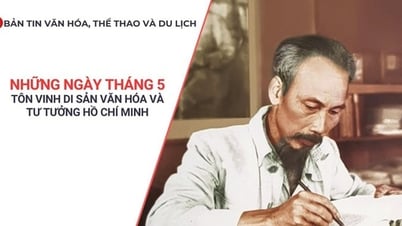Increase taxes to reduce tobacco consumption, protect people's health
Increasing tobacco taxes is not only an economic measure to reduce consumption, but also an opportunity to reinvest revenue into public health programs to protect people's health.
The health burden of tobacco use in Vietnam is very high.
Vietnam is currently facing an alarming level of tobacco use, with about 15.3 million direct smokers and millions more exposed to second-hand smoke.
This causes a huge burden on public health and the national health system. Every year, in Vietnam, it is estimated that there are more than 84,500 deaths due to active smoking and 18,800 deaths due to diseases caused by exposure to second-hand smoke. According to statistics from the Ministry of Health , direct medical costs and economic losses due to tobacco in Vietnam are estimated at VND108,000 billion per year, 5 times the revenue from tobacco taxes.
 |
| Illustration |
Currently, excise tax on cigarettes accounts for only 38.8% of the retail price, much lower than the World Health Organization (WHO) recommendation of 70-75%. Therefore, increasing tobacco tax can help reduce consumption, especially among young people and the poor.
Ms. Phan Thi Hai, Deputy Director in charge of the Tobacco Harm Prevention Fund, emphasized that increasing taxes will reduce access to tobacco, thereby reducing the rate of use, reducing deaths and health damage. Previously, Vietnam has implemented several tax increases, but the interval between increases was too long, the increase was low, and did not create a large enough impact.
Speaking more about this, according to Ms. Hoang Thi Thu Huong, Department of Legal Affairs, Ministry of Health, tobacco tax was first applied in 1999 with a tax rate of 45%, then adjusted over the years, but was still not strong enough to significantly reduce consumption.
A 10% increase in cigarette prices would reduce consumption by 4-5% in low- and middle-income countries, with a significant effect on young people and the poor.
Agreeing with the increase in tobacco tax, Ms. Le Thi Thu, an expert from the Campaign for Tobacco-Free Children, also affirmed that tobacco tax is an effective measure in the strategy to reduce tobacco consumption, and that increasing tax to the level recommended by WHO is necessary.
According to the representative of the World Health Organization in Vietnam, imposing a tax with a clear roadmap, such as reaching 15,000 VND per pack by 2030, can reduce the smoking rate among men to 35.8%, while increasing tax revenue for the national budget.
The total economic loss caused by tobacco in Vietnam each year is up to 108,000 billion VND, 5 times higher than the tobacco tax. This is a huge expense that society is having to bear. Therefore, increasing tobacco tax is not only a medical solution but also an effective measure to reduce the economic burden on the country.
Benefits of increasing tobacco taxes
Raising tobacco taxes has been shown to be one of the most effective measures to reduce consumption.
According to research by the World Health Organization (WHO), a 10% tax increase can reduce tobacco consumption by an average of 4% to 8%, especially in low- and middle-income countries like Vietnam. Young people and the poor are most vulnerable to price changes, as they have lower ability to pay.
Increasing taxes will reduce access to tobacco for young people and the poor, groups that are more likely to be drawn into smoking because they lack the knowledge and ability to prevent it.
This is one of the reasons why applying high taxes on tobacco is an important solution in the strategy to prevent and combat the harmful effects of tobacco in Vietnam.
Increase budget revenue and invest in public health. According to WHO forecasts, if Vietnam increases tobacco taxes, revenue from tobacco taxes can increase significantly, up to tens of thousands of billions of VND per year, contributing significantly to the national budget.
These revenues can be reinvested in public health programs, tobacco control, patient support, or providing free smoking cessation services to those in need.
Increasing tobacco taxes also helps improve public health. The government can use the revenue from tobacco taxes to develop campaigns to raise awareness about the harmful effects of tobacco, and to create health education programs in schools, communities and workplaces.
This will help raise public awareness, especially among the younger generation, who are at high risk of exposure to tobacco.
At recent National Assembly sessions, the issue of increasing tobacco taxes to reduce consumption has attracted much debate and opposition.
Some National Assembly deputies said that increasing taxes is an effective and urgent solution to reduce tobacco use, while minimizing the serious health and economic consequences caused by tobacco.
Delegate Hoang Thi Thanh Thuy, National Assembly Delegation of Tay Ninh province, spoke at the meeting, highlighting the importance of applying a reasonable tax increase roadmap to prevent the dangers of tobacco to people's health, lives and livelihoods, as well as negative impacts on the socio-economy.
National Assembly deputies highly appreciated the Government's proposal to apply a mixed tax calculation method for cigarettes, combining both rate tax and absolute tax.
The goal is that by 2030, the absolute tax rate will reach VND10,000 per cigarette pack, and the tax rate in the retail price of cigarettes will reach 75%, according to the recommendation of the World Health Organization (WHO). Ms. Thuy also emphasized the strategy of reducing the rate of tobacco use among men aged 15 and over to below 36% by 2030.
According to WHO statistics, tobacco is the cause of 8 million deaths each year worldwide, of which 1 million people die from passive smoking. In Vietnam, about 70,000 people die from tobacco-related diseases every year.
Delegates pointed out that Vietnam is currently among the countries with the lowest cigarette prices and the highest rate of male smokers, leading to huge economic losses, accounting for 1.14% of GDP each year.
Ms Thuy also mentioned concerns about the sudden tax increase, which could lead to cigarette smuggling or affect the tobacco industry and tobacco farmers. However, she affirmed that the potential harm from tobacco is much greater than the above concerns.
She proposed that the Government and the National Assembly consider a stronger tax increase option, with a tax rate of 75% and an absolute tax of VND15,000/pack by 2030, and that there should be an annual tax increase plan to achieve the United Nations' tobacco control goals.
In addition, delegate Duong Khac Mai, National Assembly Delegation of Ho Chi Minh City, also expressed his opinion on imposing special consumption tax on cigarettes according to option 2, saying that this is a reasonable option and will help reduce cigarette consumption quickly. Mr. Mai also suggested clarifying the regulations on the absolute tax rate applied to each pack of cigarettes, to ensure the effectiveness of the policy.
Increasing tobacco taxes is an important and effective measure to reduce tobacco use in Vietnam, while helping to reduce the disease burden and economic losses caused by tobacco.




![[Photo] Readers line up to visit the photo exhibition and receive a special publication commemorating the 135th birthday of President Ho Chi Minh at Nhan Dan Newspaper](https://vphoto.vietnam.vn/thumb/1200x675/vietnam/resource/IMAGE/2025/5/17/85b3197fc6bd43e6a9ee4db15101005b)


![[Photo] Nearly 3,000 students moved by stories about soldiers](https://vphoto.vietnam.vn/thumb/1200x675/vietnam/resource/IMAGE/2025/5/17/21da57c8241e42438b423eaa37215e0e)











![[Infographic] Numbers about the 2025 High School Graduation Exam in Dong Thap Province](https://vphoto.vietnam.vn/thumb/402x226/vietnam/resource/IMAGE/2025/5/17/c6e481df97c94ff28d740cc2f26ebbdc)

















































































Comment (0)